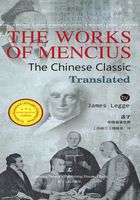
CHAPTER XVI
1. The duke P'ing of Lû was about to leave hispalace, when his favourite, one Tsang Ts'ang, made a request to him, saying, 'On other days, when you have gone out, you have given instructions to the officers as to where you were going. But now, the horses have been put to the carriage, and the officers do not yet know where you are going. I venture to ask.' The duke said, 'I am going to see the scholar Măng.' 'How is this?' said the other. 'That you demean yourself,prince, in paying the honour of the first visit to a common man, is, I suppose, because you think that he is a man of talents and virtue. By such men the rules of ceremonial proprieties and right are observed. But on the occasion of this Măng's second mourning, his observances exceeded those of the former. Do not go to see him, my prince.' The duke said, 'I will not.'
2. The officer Yo-chăng entered the court, and had an audience.


Compare chap. vii. 为=专, 'to take the whole disposal of', to deal with. It is not to be referred to the 守. The paraphrasts make the whole spoken by the ruler;—thus:—'The territory of the State was handed down by my ancestors to their descendants, that they should keep it from generation to generation. It is not what I can assume in my person the disposal of. If calamities and difficulties come, my course is to fight to the death to keep it. I may not abandon it, and go elsewhere.'The meaning comes to the same. But the 勿 is against this construction.
CHAPTER 16. A MAN'S WAY IN LIFE IS ORDERED BY HEAVEN. THE INSTRUMENTALITY OF OTHER MEN IS ONLY SUBORDINATE.
1. The duke P'ing (i.e. 'The Pacificator') had been informed of Mencius's worth, it appears, by Yo-chăng,and was going out,


He said, 'Prince, why have you not gone to see Măng K'o?' The duke said, 'One told me that, on the occasion of the scholar Măng's second mourning, his observances exceeded those of the former. It is on that account that I have not gone to see him.' 'How is this!'answered Yo-chăng. 'By what you call "exceeding"you mean, I suppose, that, on the first occasion, he used the rites appropriate to a scholar, and, on the second, those appropriate to a great officer; that he first used three tripods, and afterwards five tripods.'The duke said, 'No; I refer to the greater excellence of the coffin, the shell, the grave-clothes, and the shroud.'Yo-chăng said, 'That cannot be called "exceeding".That was the difference between being poor and being rich.'
3. After this, Yo-chăng saw Mencius, and said to him, 'I told the prince about you, and he was consequently coming to see you, when one of his favourites, named Tsang Ts'ang, stopped him, and therefore he did not come according to his purpose.'Mencius said, 'A man's advancement is effected, it may be,


half-ashamed at the same time to do so, to offer the due respect to him as a professor of moral and political science, by visiting him and asking his services. The author of the 四书拓余说 approves of the view that the incident in this chapter is to be referred to the 4th year of the sovereign 报, B.C. 311, but the chronology of the duke P'ing is very confused. 所之,—之=往. 何哉 is an exclamation of surprise, extending back to前丧. In 以为贤乎, the 乎 is hardly so much as an interrogation. I have given its force by—'I suppose'.出 does not indicate the origin of rites and right, but only their exhibition. The first occasion of Mencius's mourning referred to was that, it is said, for his father. But his father died, according to the received accounts, when he was only a child of three years old.We must suppose that the favourite invented the story.I have retained the surname Măng here, as suiting the paragraph better than Mencius.
2. 乐正 is a double surname. This individual, whose name was K'e (克;—see par. 3), was a disciple of Mencius. The surname probably arose from one of his ancestor having been the music-master of some State,and the name of his office passing over to become the designation of his descendants. The tripods contained the offerings of meat used in sacrifice. The sovereign used nine, the prince of a State seven, a great officerfive, and a scholar three. To each tripod belonged its appropriate kind of flesh.
3. 君为来,—为, 4th tone,= 'therefore', i.e. in consequence of what Yo-chăng had said, the duke was going to visit Mencius.


by others, and the stopping him is, it may be, from the efforts of others. But to advance a man or to stop his advance is really beyond the power of other men. My not finding in the prince of Lû a ruler who wouldconfide in me, and put my counsels into practice, is from Heaven. How could that scion of the Tsang family cause me not to find the ruler that would suitme?'

尼 is read in the 3rd and 4th tones, both with the same meaning,=止, 'to stop'. 不遇鲁君 is not spoken merely with reference to the duke's not coming, as he had purposed, to meet him. The phrase 不遇 really conveys all the meaning in the translation, however periphrastic that may seem. With this reference of Mencius to Heaven, compare the language of Confucius. Analects,VII. xxii; IX. v; XIV. xxxviii.